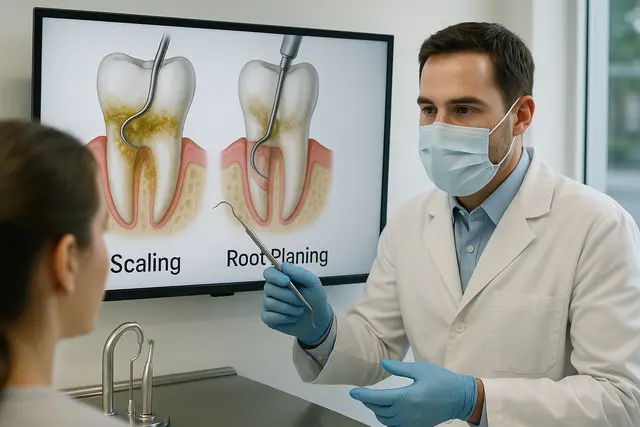General Dentistry
5 min read
May 12, 2025
What Causes an Overbite? Common Reasons & How to Prevent It
If your smile seems a little off or your front teeth don’t quite line up the way they should, you might be dealing with an overbite, and you’re definitely not alone. Overbites are one of the most common dental issues, and while they might seem like just a cosmetic concern, they can lead to bigger problems if left untreated.

When Your Front Teeth Don’t Quite Play Nice
An overbite refers to the way your upper front teeth overlap the lower front teeth when your mouth is closed. Technically, everyone has a bit of an overbite, it’s completely normal. But when those top teeth extend far beyond your lower teeth, or if your front teeth jut out in a way that looks and feels off, that’s when it’s time to raise an eyebrow.
This type of misalignment can affect more than just your appearance. An untreated overbite can cause dental issues, jaw pain, speech problems, and even lead to self-consciousness about your smile. If you’ve ever looked in the mirror and thought, “Are my teeth supposed to do that?”, you’re in the right place.
Let’s talk about what causes an overbite, why it happens, and what you can do to fix your overbite and feel good about flashing those pearly whites again.
What Can Cause an Overbite in the First Place?
Overbites often start young. Childhood habits like thumb sucking, prolonged pacifier use, or pushing on the front teeth with the tongue can set the stage for your upper teeth to extend beyond the lower front teeth. These small actions place pressure on the teeth and jaw as they grow, nudging things out of alignment.
But it’s not just about childhood habits. Genetics play a pretty big role too. If Mom or Dad had an overbite, there’s a chance you’ll develop an overbite yourself. A mismatch in the size of your jaw and teeth can also contribute. For example, if the upper jaw is too big, or the lower jaw too small, it can cause the upper front teeth to protrude.
Teeth grinding (aka bruxism) is another sneaky culprit. It can wear down the enamel, change the bite, and shift your teeth into improper positions. And don’t forget poor posture or leaning on your hand all day at work, believe it or not, even your resting habits can influence the alignment of your teeth and jaw.
Common Causes of Overbites You Might Not Expect
Let’s break it down with a few real-life scenarios:
Tongue thrusting: Pressing your tongue against your front teeth when swallowing? That gentle push adds up over time.
Teeth grinding: That nighttime clenching not only messes with your jaw but can lead to a deeper overbite.
Missing teeth: If you’re missing molars, the remaining teeth may shift and allow the front teeth to move forward.
Inherited bone structure: Some people are born with a jaw shape that makes an overbite more likely.
Bad habits: Nail biting, pencil chewing, and constant snacking on hard foods can affect your bite.
No matter the cause, the result is similar: your top front teeth overlap the lower front teeth, sometimes by a little, sometimes by a lot.
When an Overbite Becomes a Problem
Sure, a slight overbite is normal. But when the alignment goes off the rails, problems start stacking up. Overbite can lead to:
Jaw pain from the constant pressure and strain
Speech issues due to the misplacement of your tongue during talking
Gum disease and tooth decay because of hard-to-clean overlap areas
Misaligned teeth that are more prone to chips and breaks
TMJ disorders and chronic headaches in severe overbite cases
The American Dental Association notes that moderate to deep overbites can cause significant issues with long-term dental health. So if your overbite is causing discomfort, or just making you feel self-conscious, it may be time to explore overbite correction.
How to Fix an Overbite (Yes, It’s Totally Doable)
Let’s get this out of the way: you don’t have to live with an overbite forever. The good news? You’ve got more treatment options than ever, from traditional braces to invisible aligners and even surgical correction for severe cases.
Braces: Traditional braces are still one of the best treatment options to fix an overbite, especially in younger patients. They gradually shift your teeth and jaw into better alignment.
Invisalign or clear aligners: Great for mild to moderate overbites. They’re discreet and removable, which means you can straighten your smile without drawing attention.
Orthodontic treatment with rubber bands: Sometimes used in tandem with braces to help pull the jaw into proper position.
Surgery: Reserved for severe overbite cases where the jaw alignment needs more than just braces to fix.
Your orthodontist will help you develop a treatment plan that’s personalized to your specific bite, age, and goals. Overbite treatment isn’t one-size-fits-all, but it is available for just about everyone.
Why Early Treatment Is the Best Treatment
Like most dental problems, the earlier you catch an overbite, the easier it is to treat. That’s why orthodontics is often started in childhood. But adults shouldn’t worry, braces and Invisalign aren’t just for teens anymore.
In fact, mild to moderate overbites in adults respond well to braces and Invisalign. A tailored treatment plan can shift your teeth into proper alignment, relieve jaw pain, and prevent bigger problems down the road.
If left untreated, though, an overbite can cause jaw strain, wear on your enamel, and even make your teeth and gums more prone to disease. Because your oral health affects more than your bite, treating your overbite early can save you time, money, and a whole lot of discomfort later.
Caring for Your Teeth During Overbite Correction
While you’re in the middle of orthodontic treatment, it’s especially important to brush your teeth regularly and keep up with dental checkups. Overbite treatment can trap food in unusual places, and good dental care helps prevent gum issues and cavities from joining the party.
Some helpful tips:
Brush your teeth twice a day with a soft-bristled brush
Floss daily (yes, every day)
Use an orthodontic flosser if you’re wearing braces
Visit your dentist every 6 months, or more often if recommended
Your teeth and gums will thank you for it, and you’ll avoid other dental problems that can sneak in while you're focused on correcting your bite.
So, What’s the Best Way to Prevent an Overbite?
You can’t always dodge genetics, but there are ways to prevent or minimize the development of an overbite:
Discourage thumb sucking early in children
Watch for signs of teeth grinding and talk to your dentist if needed
Address crooked teeth and crowding early with orthodontics
Maintain regular dental visits to spot issues before they worsen
Replace missing teeth promptly to avoid shifting
Practice good posture (yes, your jaw’s alignment depends on that too)
Preventing an overbite often means paying attention to the small stuff. A little awareness now can save you a major dental overhaul later.
Wrapping Up
Overbites can be frustrating, and sometimes they sneak up on you. But they’re also incredibly common, and totally treatable. Whether your overbite is mild to moderate or a severe overbite that’s causing pain, there are clear steps you can take to get your smile back on track.
Remember, the best treatment is the one that fits you, your bite, your jaw, your lifestyle. With the right guidance, a custom treatment plan, and a little bit of patience, you can fix your overbite, protect your dental health, and feel great every time you smile.
What Causes an Overbite to Develop?
Overbites often begin in childhood and can result from habits like thumb sucking, prolonged pacifier use, or tongue thrusting. Genetics also play a major role, if your parents had an overbite, you might inherit the same jaw structure. Other causes include teeth grinding, missing teeth, and even poor posture, all of which can shift the teeth and jaw out of alignment over time.
When Does an Overbite Become a Problem?
A slight overbite is normal, but when the overlap becomes excessive, it can lead to jaw pain, speech difficulties, tooth wear, gum problems, and even TMJ disorders. If your overbite causes discomfort, makes oral hygiene difficult, or affects your confidence, it's considered a functional or cosmetic concern worth addressing with your dentist or orthodontist.
What Are the Most Common Ways to Fix an Overbite?
Treatment options vary based on severity and age. Braces are the most common solution, especially for kids and teens. Clear aligners like Invisalign work well for mild to moderate cases in adults. In more complex cases, rubber bands or even jaw surgery may be necessary. Your orthodontist will recommend a custom plan to correct your bite and realign your teeth.
Can Overbites Be Prevented?
While you can’t prevent every overbite, especially if it’s genetic, you can lower the risk by addressing bad habits early. That includes discouraging thumb sucking in kids, treating teeth grinding, replacing missing teeth promptly, and getting orthodontic care when needed. Regular dental checkups also help catch bite issues before they worsen.
Read Next
Related Posts

General Dentistry
How to Stop Nerve Pain in Tooth: Fast Relief That Works
Tooth nerve pain can be one of the most intense and disruptive types of discomfort. It often strikes without warning and makes everyday activities like eating, drinking, or even talking feel unbearable. Understanding what causes this pain and how to manage it effectively is key to getting fast relief.
4 min read
Sep 15, 2025

General Dentistry
Can a Sinus Infection Make Your Jaw Hurt? Understanding the Connection
Jaw pain can be unsettling, especially when it seems to appear out of nowhere alongside a stuffy nose or headache. Many people are surprised to learn that sinus infections can cause discomfort that feels like it’s coming from the jaw. Understanding the connection between your sinuses and jaw pain is key to getting the right treatment.
5 min read
Sep 15, 2025

General Dentistry
What Is SRP in Dentistry? A Complete Guide to Scaling and Root Planing
When it comes to dental health, most people think regular cleanings are enough to keep their smile safe. But sometimes, what’s happening below the gumline needs more attention. Scaling and root planing (SRP) is a treatment designed to address gum disease at its source, protecting both your gums and teeth from long-term damage.
5 min read
Sep 10, 2025
Don’t have time to research every dentist around you?
See why 30k+ patients trusted us